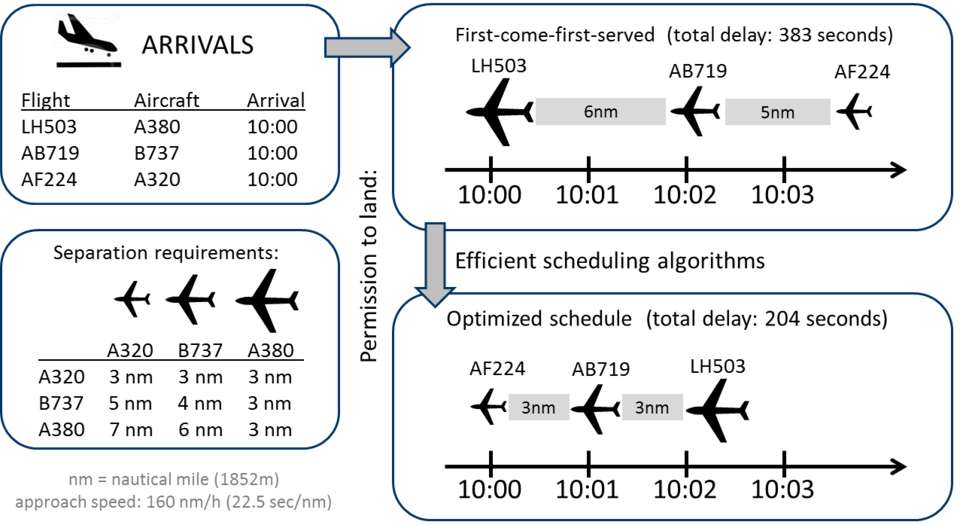
Dissertation Project
Three Essays on Operations Scheduling with Job Classes and Time Windows
Date of Defense
27 November 2015
Summary
Operations scheduling is a prominent combinatorial optimization problem with many different applications in production management and service operations. Its goal is to assign jobs to resources and determine their order as efficiently as possible. Due to its high complexity it is usually solved heuristically, e.g., using priority rules. Sequence-dependent processing times and limited time windows further increase complexity. This thesis focuses, amongst others, on the „Aircraft Landing Problem“: A number of aircraft (i.e., jobs) approach an airport and have to be assigned to runways (i.e., resources) and landing times while considering the sequence-dependent separation requirements between two landings. Using mixed-integer programming, the problem is intractable even for small instances. Yet, by dividing jobs into classes with similar properties (e.g., aircraft of the same type), small instances can be solved to optimality efficiently using dynamic programming approaches. These approaches also serve as basis for heuristics to tackle large instances. Other applications for the proposed approaches are single-stage production scheduling problems with groups of similar jobs as well as task assignment problems with groups of similar tasks, e.g., in hospitals and nursing homes.
Refereed publications
- Lieder, A. and R. Stolletz (2016): Scheduling Aircraft Take-Offs and Landings on Interdependent and Heterogeneous Runways. Transportation Research Part E: Logistics and Transportation Review 88, 167–188.
- Lieder, A., D. Briskorn, and R. Stolletz (2015): A Dynamic Programming Approach for the Aircraft Landing Problem with Aircraft Classes. European Journal of Operational Research 243 (1), 61–69.
- Lieder, A., D. Moeke, G. M. Koole, and R. Stolletz (2015): Task scheduling in long-term care facilities: A client-centered approach. Operations Research for Health Care 6, 11–17.
Presentations at international conferences (selection)
- Lieder, A. and R. Stolletz (2015): Scheduling aircraft take-offs and landings on parallel runways. EURO 2015, Glasgow, UK, July 2015.
- Lieder, A., D. Moeke, R. Stolletz, and G. Koole (2014): Efficient Task Scheduling in Long-term Care Facilities. IFORS 2014, Barcelona, Spain, July 2014.
- Lieder, A., D. Briskorn, and R. Stolletz (2013): An efficient algorithm for scheduling groups of jobs with individual release dates. OR 2013, Rotterdam, Netherlands, September 2013.
- Lieder, A., R. Stolletz, and D. Briskorn (2012): Scheduling aircraft landings using dynamic programming. EURO 2012, Vilnius, Lithuania, July 2012.
- Lieder, A., R. Stolletz, and D. Briskorn (2011): A dynamic programming approach to the aircraft landing problem with aircraft classes. OR 2011, Zurich, Switzerland, September 2011.
(view all)
Teaching experience
- University of Mannheim (2011–2015, selection)
– OPM 350 Production and Operations Management (B. Sc.)
– OPM 662 Modeling and Optimization of Operations Scheduling (M. Sc.)
– OPM 761 Research Seminar Production Management (M. Sc.)
- Hochschule Worms (since 2015)
– Operations Management – Produktion und Logistik (B. Sc.)
- Europäische Fachhochschule (EuFH) (2010)
– Entscheidungsorientiertes Datenmanagement (B. Sc.)
Awards and grants
- Scholarship of the Erich-Becker-Stiftung for the dissertation project „Development of applied optimization algorithms for scheduling airport runway operations“, 2013–2015
- „Information Systems Undergraduate Award 2006“ of the Faculty of Management, Economics and Social Sciences at the University of Cologne
Education
- 2011 – 2015
Doctoral Studies at Business School, University of Mannheim
- 2004 – 2009
Studies in Business Information Systems, University of Cologne
